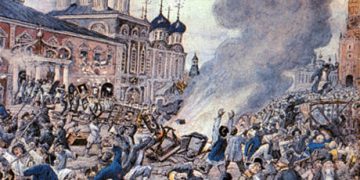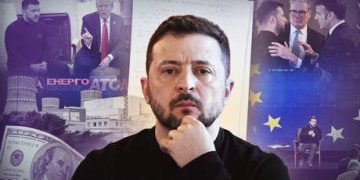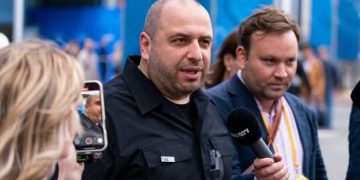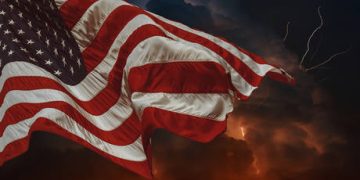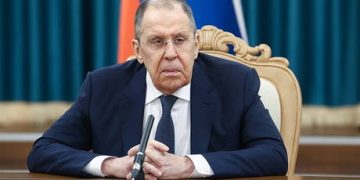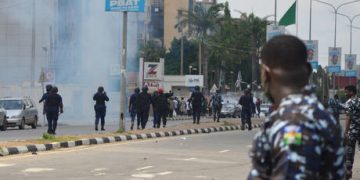September 9, 2025, 1:38 pm
Author – Greg Grandin


On September 2, President Donald Trump posted a 29-second black-and-white video of a high-prow, four-engine speedboat. At the 20-second mark, there’s a bright flash and fire. Trump claimed the footage was shot that morning, and that it showed the U.S. military destroying the vessel, killing 11 Tren de Aragua members smuggling drugs bound for the United States.
In the week since, little more information about the strike has been made public. No one has disclosed the coordinates where it took place, or any evidence that, as the administration insists, the vessel was carrying drugs and those onboard were smugglers. The administration hasn’t even said what kind of drug was being smuggled. No bodies have been fished out of the sea. No debris.
On Friday, Trump officials canceled, without explanation, a scheduled briefing with the Senate Intelligence Committee to discuss the attack. When challenged about the legality of the killing, Vice President JD Vance tweeted that he didn’t “give a shit.” “Killing cartel members who poison our fellow citizens is the highest and best use of our military,” he said, and more such actions should be expected.
No doubt the assault is par for Trump’s general MO, an expression of his aggrieved nationalism: the idea that the country is besieged by a variety of threats, among them Latin American drug traffickers. According to Pete Hegseth, the secretary of what until recently was the Department of Defense, now the Department of War, the killing was a defensive act against enemies trying “to poison our country with illicit drugs.”
Yet there’s no proof that the 11 people were smugglers or migrants. The kind of go-fast boat shown in the video are called pangas. They can’t carry enough fuel to get to the United States. They are used for smuggling, but also for trading and fishing. It was likely headed to Trinidad, where might have transferred cargo to larger ships bound for the United States.
Whether the vessel was carrying cocaine, migrants, or mackerel, our country’s highest officials are boasting about assassinating 11 human beings, civilians, traveling in a small ship in international waters who have not charged with, much less proven guilty of, a crime.
People should be outraged at what is in effect pure murder. But they should also be looking at why the U.S. military is suddenly shifting its focus to the Caribbean, amassing navy vessels and thousands of sailors off the shores and carrying out such a brazen strike. If they look close enough, they might see what the Trump administration is after — and the rift within Trump’s coalition that might scuttle his Latin American plans.
The Latin American Pivot
During this fraught geopolitical moment, as Washington hemorrhages global influence, the U.S. bipartisan strategic class is turning, as it often turns during crisis times, to Latin America.
A few years ago, Army Gen. Laura Richardson, as Biden’s head of SOUTHCOM — the branch of the Pentagon charged with policing South America and the Caribbean — gave a series of think-tank talks on the importance of the region’s resources to the United States: “You have heavy crude. You have light sweet crude. You have rare earth elements,” she told the Aspen Security Forum: “You have 31 percent of the world’s freshwater. … Sixty percent of the world’s lithium is in the lithium triangle: Argentina, Bolivia, Chile. … You have Venezuela’s resources as well, with oil, copper, gold.”
Latin America is “off-the-charts rich” when it comes to resources, the general said, and Washington’s “adversaries” — Russia and China — want a cut. Moscow and Beijing had consolidated their influence in Cuba, Nicaragua, and Venezuela, and were forging alliances with Brazil, Chile, Mexico, and Argentina.
Richardson said the best way to secure access to the region’s riches was through “engagement” — that is, refraining from using overt forms of dominance and working to shore up soft-power alliances, including commercial treaties.
There are those, a minority to be sure, within the Trump administration who think the same. First among them is Richard Grenell, who has long advocated for normalizing relations with Venezuela. A close friend of the president, Grenell holds the catch-all title of “special envoy for special missions,” allowing him to carry out under-the-table diplomacy. Grenell is an anti-NATO America Firster who believes that a non-conflictive approach to Latin America is the best way the U.S. can ensure access to essential resources in a fracturing world.
So even as the White House was ramping up its rhetoric against Caracas — in effect declaring the entire Venezuelan government a cartel and President Nicolás Maduro its “kingpin” — Grenell scored an important victory, obtaining licenses allowing Chevron to bypass Washington’s harsh sanctions (first imposed by George W. Bush and then strengthened by every president since) to start pumping Venezuelan crude.
Chevron tankers began delivering Venezuelan oil to Port Arthur, Texas, just weeks before the assault on the speedboat. On September 3, a day after the bombing of the boat, Reuters reported that Venezuela’s oil exports to the U.S. had risen sharply, oil that otherwise would have been sent to China.
Harry Sargeant III is another within Trump’s circle who shares Grenell’s deal-making approach to Latin America. A Mar-a-Lago billionaire who made a fortune off Pentagon contracts delivering oil to U.S. troops during the Second Gulf War, Sargeant is a major Republican donor. He’s also a confidant of Maduro, and works, even during the Biden presidency, as a Caracas–Washington go-between. He runs, under special waiver, several lucrative operations in Venezuela, including exporting asphalt. And Trump’s current chief of staff, Susie Wiles, had earlier worked for Ballard Partners, a lobbying firm whose clients included both Trump and Venezuelan businesses tied to Maduro.
For his part, Venezuela’s Maduro, with few close allies of consequence in Latin America apart from those who defend Caracas on the principle of sovereignty, would be happy to make a deal with these profit-seeking elements of the Trump administration.
Marco Makes His Move
Trump says he gave the order to bomb the speedboat, the most lethal U.S. military operation in Latin America since its 1989 invasion of Panama. Yet the brinkmanship belongs to Secretary of State Marco Rubio. By raising the stakes and promising that such attacks will continue, Rubio is looking to gain hard-liners the upper hand against appeasers like Grenell — especially if the fallout from the executions forces Chevron to shut down its Venezuelan operations.
Rubio had tried to block Chevron’s license from going through, delaying it numerous times. He has opposed efforts by Sargeant and others in the business lobby to obtain similar exemptions for individual companies, instead pushing for a universal ban on U.S. business activity in Venezuela.
Rubio, in earlier electoral campaigns when he ran against Trump, held himself up as the defender of the liberal international order, a champion of NATO and advocate of Ukrainian sovereignty.
Now, he might as well hoist the Jolly Roger over the State Department, as he applauds the piratical murder of civilians traveling in defenseless open boats on the high seas. “It will happen again,” Rubio said menacingly, promising another strike against civilians.
During Trump’s first term, Rubio, as Florida’s senator, worked in league with then-national security adviser John Bolton. The duo was largely responsible for the fiasco of pretending that the head of the national assembly, Juan Guaidó, was the real president of Venezuela in a bid to overthrow Maduro. The farce led to a botched mercenary invasion and, finally, to the Venezuelan opposition itself stripping Guaidó of his “presidential role.”
That escapade didn’t chastise Rubio, who, apart from whatever statesmanship he once aspired too, can’t escape Florida provincialism. Joan Didion, in her book “Miami,” describes anticommunist Cuban exiles as controlled by “a kind of collective spell, an occult enchantment,” a “febrile complex of resentments and revenges.” Mixed with Trumpism, that enchantment is a powerful propulsive, fueling a desire to vanquish not just left-wing authoritarians in Cuba, Venezuela, and Nicaragua but also squishy social democrats in Brazil and Chile, who criticize Israel and sell their soy beans and lithium to China.
Rubio, who like Kissinger years ago serves as both secretary of state and national security adviser, is part of a hard-line interagency war machine that includes Hegseth at the Department of Defense, er, War; CIA Director John Ratcliffe; Lt. Col. Michael Jensen, a veteran of special forces, at the National Security Council, and Terrance Cole at the Drug Enforcement Administration. Vance seems to function as this group’s cheerleader.
They are all maximalists, looking to fuse the war on drugs with the war on terror.
They are all maximalists, looking to fuse the war on drugs with the war on terror — with the goal not to nudge Cuba, Nicaragua, and Venezuela toward more open societies but to bring the hammer down on the continent: sanctions, reaper drones, covert ops, concentration camps, election manipulation, an expansion of DEA operations, and, as promised, more bombs, more civilian deaths.
“It’s a war. It’s a war on killers. It’s a war on terror,” Rubio says. And the U.S. can use El Salvador and Ecuador, corrupt and repressive narco-states, as launching pads for Rubio’s war.
ExxonMobil has Rubio’s back. Unlike Chevron, Exxon, in 2007, refused to participate in “joint ventures” with Venezuela’s government, then led by the now-deceased Hugo Chávez. In response, Venezuela seized the company’s holdings, leading to more than a decade of litigation.
Today, Exxon and Chevron are antagonists, each vying for control of massive oil reserves off the coast of Guyana, which shares a contested border with Venezuela. The situation echoes the 1930s, when Royal Dutch Shell backed Paraguay and Standard Oil backed Bolivia, pushing the two countries into a brutal war over a vast stretch of scrubland believed to contain a vast underground oil lake. Then, there was no oil: the petroleum that was said to exist was a mirage. Today, though, the petroleum is real. Venezuela alone possesses the largest proven crude reserves in the world, approximately 303 billion barrels — more than Saudi Arabia. Added to that is an estimated 15 billion barrels, light and sweet and easy to pump, in Guyana’s offshore fields.
Considering that the age of oil is not ending any time soon, any reorganization of hemispheric relations would require getting Venezuela in order: but under want terms? Rubio’s call to war or Grenell’s crudepolitik?
Importing the Logic of Gaza
Rubio is playing a dangerous game importing the hideous logic of Gaza — unaccountable extrajudicial murder justified by an expansive definition of self-defense — into the Western hemisphere.
A day after the attack, Maduro dispatched two F-16s to fly low over Trump’s warships, which brought a rebuke from Washington.
A conventional war, though, is unlikely. Caracas’ main response has been to try to drive a wedge between Trump and Rubio. “Mr. President Donald Trump, you have to be careful because Marco Rubio wants your hands stained with blood, with South American blood, Caribbean blood, Venezuelan blood,” Maduro said after the attack, going on to note that he’s opened backchannel negotiations with Grenell to deescalate the conflict. “I respect Trump,” Maduro has said, probably not insincerely.
Trumpism has a social base in Latin America, but there’s little appetite for a full-on ideological crusade. Both Colombia and Mexico suffered badly under previous efforts by the U.S. to use military force in response to narcotic production and trafficking. Politicians across the political spectrum, at least those not openly allied with Rubio such as El Salvador’s Nayib Bukele and Ecuador’s Daniel Noboa, want to end not escalate Washington’s half-century war on drugs.
Rubio’s Venezuela play will probably backfire, as it did during Trump’s first term. Trump operates in that middle ground between Rubio and Grenell, talking tough but always signaling that a deal is in the works. And he’s denied that the U.S. wants “regime change” in Venezuela, no matter the fact his Department of Justice has just raised the bounty on Maduro’s head to $50 million.
But the rhetorical momentum is on the side of the maximalists. The Pentagon followed its attack on the speedboat by ordering the deployment of 10 F-35 stealth fighter jets to Puerto Rico, to be used to conduct further strikes against alleged cartel activity, on sea and on land, including in Venezuela.
As pressure builds on Trump at home, so will the urge to act abroad, to do something spectacular. The economy is stalling, inflation and unemployment climbing, and the world is de-dollarizing; Trump’s poll numbers are slipping, and Democrats might take the House during the midterms; the ongoing war in Ukraine and genocide in Gaza exposes Washington’s diplomatic feebleness; troops patrolling city streets and masked ICE agents invading neighborhoods worsen the country’s polarization.
And so, the temptation to turn the hard-liners loose in Latin America will be difficult to resist. As a distraction. To renew a sense of purpose. To affirm, at least among the faithful, unity. And to get that sweet crude.
The post The Rift in Trump World Over Venezuela appeared first on The Intercept.
Full Article
Author: Greg Grandin


